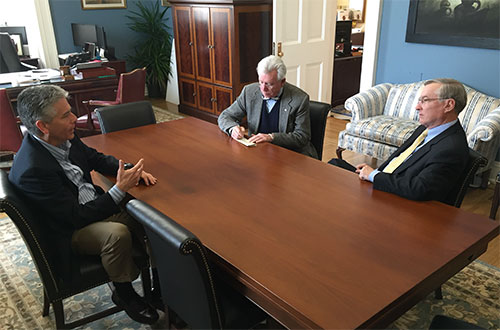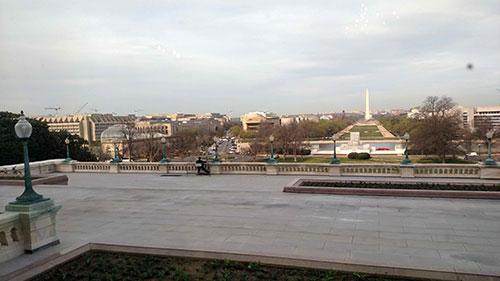
(Sergeant at Arms Frank Larkin, left, speaks to Jake at right while the humble scribe scribbles).
Altogether an eye-opening morning with lots of information to process. The reason we were treated so well on The Hill was the active intervention of a former colleague who retired (finally!) from his career at the Agency, and fond a position as Deputy Counsel to the Sergeant at Arms for the United States Senate. Parking on the Campus, inside the security perimeter! Life does not get better in Washington!
He loves his job, and is still enamored of the place, as most of us who had a chance to work in Wonderland do..
I am writing about the Sergeant At Arms of the United States Senate this morning. Just when you think you have seen it all as a confirmed insider here in the Emerald City, someone lifts a curtain turns and reveals something entirely new.
I knew Appropriators and Authorizers, the difference between them, the “Five Committees,” my office had to deal with, what was what on the House and Senate sides, and the quirks that go along with both of them. I stumbled through policy and acquisition issues when I worked up there, and after planning and executing a dozen Staff Delegations, was pretty confident I knew what was gong on in that rarified atmosphere.
But that was an erroneous opinion. There is a whole world that maintains the ponderous façade, and we got a chance to talk to the man who runs half of it. Frank Larkin is an amazing man, and one of the few bright spots in the Government I no longer recognize as being much like the one I served all those years.
The Sergeant is an elected official, by the way. Frank was nominated by the Majority Leader and elected by the Senators themselves. He said: “I wasn’t looking for this job, but Senator McConnell asked me to come down and talk to him, and I couldn’t turn it down.”

(A selection of the equipment a Sergeant At Arms might need at any given time and a glimpse of the construction through one of Frank’s two windows).
Frank Larkin has done pretty much everything, and is the prototype of the Great American warrior and first responder. He was a SEAL (he called himself a “young Frogman”), a sworn police officer, paramedic (he still stands two shifts a month to stay qualified) followed by a full career in the Secret Service. Like I said, amazing. But one of the most memorable details of his life was as a supervisor in the New York Field Office, located in the World Trade Center. He was awarded a Medal of Valor for his life-saving actions at Ground Zero.
So if you are looking for the complete package of honor, courage and sheer dedication, Frank Larkin would be your guy. And transient. As everyone on the Hill knows, should the Senate go back to the Democrats this fall, he will be thanked for his service and sent packing from the marvelous corner office with two- count ’em two- windows.
Given the horror that had occurred in Brussels that morning (is there anything that happens overseas these days that does not make you cringe or flinch?) Frank was a busy man, but generous with his time. He had been awakened with the news of the attack from the Capitol Police Command Center, and then got on with the status of the various Senate delegations, member and staff, that were potentially in harm’s way.
That is the broad sweep of his responsibilities, which he described as being:
Protocol, the most visible public function of his office.
Information Technology, since he is the provider for the IT the Senators and their staffs in both the Capital Hill and home offices. Tough job in today’s cyber environment, and dealing with data that is not his. I asked if he was able to retain top quality people, given the times, and he said the prestige associated with the office brought some of the best talent from place like Air Force CYBERCOM and the White House Communications Office.
Law enforcement. He is responsible for security on what he called “The Campus,” which means being in the middle of the wild cacophony of police forces. Within sight if his window, there is the Capitol Police, the Park Police, the DC police, DoD police and individual Agency protective services. As such, his home turf is the Campus, and that involves sitting on the three-person board that overseas the Capitol Police.
The others on the board naturally include his opposite number from the House side and the Architect of the Capitol. “That sounds odd,” he confided with a laugh, “But the arrangement dates from the late 19th century.” It is Congress, after all. “But I suppose it makes sense, since that office is responsible for all the physical infrastructure.”
We asked about what his budget authority was and how many troops he had in his part of the puzzle to carry it all off.
“We get about $100 million to do the job, and I have around 3,500 people on the payroll, which includes the law enforcement, IT and a thousand folks who do the Continuity mission.”
Jake and I looked knowingly at one another. “I always aspired to be a site manager for one of the undisclosed locations,” I said. “No one to see for months at a time and living the good life out in the country. One guy we worked with at your site had J. Edgar Hoover’s desk down in his lair. I thought it must be one of the most surreal government jobs, ever.”
“It is indeed,” agreed Frank. “But I have to tell you, having the responsibility to protect the Senators and their staffs when they are on official travel is the real headache.’
“Responsibility,” said Jake, “but no authority or resources.”
Frank nodded gravely. “Not to mention the railway.”
We had a good laugh about that, since there is an actual rail system that services the Campus, deep underground. It was one of my favorite things to do when I escorted VIPs up to the Committees or to meet with members. I would duck in a side door at the House Dirksen Building, head for the basement, and wind up in the Capitol or over on the Senate side with the VIP completely disoriented and at my mercy.
At length, we talked about the uncertain future and the evolving nature of the threat to our public institutions. As he ended the meeting after nearly an hour, we shook hands all around.
“Frank, you are a Great American, and it was an honor to meet you. Thank-you for your time.”
We walked out of the office with the grand views of the construction that they swear will be complete by the next inauguration, regardless of who it is.
I would tell you about the rest of the morning there on the Hill, but there is a guy I want to tell you about tomorrow, and a ride on the railroad, and a lunch at what is probably the most celebrity-clogged eateries in the Capital of the Free World.
So bear with me. It was a great morning with the Sergeant of Arms.

(Not a bad view from the Sergeant’s office, looking up the National Mall to the Washington Monument. The Museum of the American Indian is in the center. They built it while I was working in the Hubert Humphrey Building to the left.)
Copyright 2016 Vic Socotra
www.vicsocotra.com
